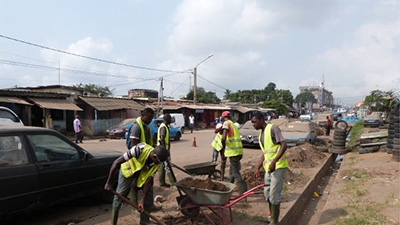Employment and self-confidence
Once hired, the young people are given the title “brigadier de salubrité” (sanitation warden). All young people between 18 and 30 years of age can apply. To assure fairness, beneficiaries are chosen through a public lottery. The program is so popular that some young people admit to praying all night that they will be among those selected.
As Côte d’Ivoire gets back on its feet following a decade of political, economic, and social unrest, tackling youth employment has become a priority,” says Hamoud Abdel Wedoud Kamil, a World Bank’s Senior Education Specialist and task leader of the PEJEDEC project. “One of the key objectives of this program is to provide participants new skills that would make them more employable, increase their earning potential and, in some cases, give them the resources to start their own businesses,” he adds.
In addition to guaranteeing six consecutive months of income to those hired — who receive monthly wages amounting to CFAF 60,000 (approximately US$124) — the labor-intensive public works program (LIPW) provides many other benefits. For example, young hirees attend life skills training sessions that raise awareness about such issues as civic responsibility and citizenship, HIV/AIDS, the environment, and public health. Some of the brigadiers also receive intensive training in job-search techniques and information on wage employment opportunities; others receive basic entrepreneurial training to help them set-up small businesses upon graduation.
For instance, Kamate Vazoumama, a young brigadier in the Koumassi district of Abidjan, is now more attuned to the issue of urban waste. “I used to throw my garbage in the street. Now I never do that,” says Kamate. As for Prince Brokou, the job was his first experience of team spirit and also built up his self-confidence. “I felt completely useless to my family, and I didn’t know what to do with my life. I often wondered, ‘Am I stupid?’ Now I know that I am not stupid; I just didn’t have the resources to launch a project,” he says.
Evaluating the effectiveness of the program
An impact evaluation is also being conducted by PEJEDEC in collaboration with the World Bank, international academics and the National School of Statistics and Applied Economics [École nationale supérieure de statistique et d’économie appliquée]. A survey was collected when youths applied for the second wave of the program followed by another survey six months into the program.
The objective is to compare the outcomes for the young people who participated in the labor-intensive public works program versus those who were not selected. An additional survey will be conducted approximately six months after young people graduate, to assess the program’s longer-term impact and particularly the youth’s ability to successfully transition to sustainable employment.
“The LIPW program is one of the pillars of the Ivorian government’s new job creation strategy. Being able to measure the results and impact of such a program on youths will allow us to adjust our strategy in order to best achieve our objective,” says Adama Bamba, the coordinator for PEJEDEC as well as the Employment Program Coordination Unit.
“While the main objective of such a program is to create temporary jobs, in theory, such a program can also generate more savings for its young beneficiaries, allowing them to acquire new resources, and can lead to lower rates of violent or harmful behaviors,” explains Alicia Marguerie, who is the PEJEDEC field coordinator for the impact evaluation.
In a report titled Youth Employment in Sub-Saharan Africa, the World Bank noted that Africa’s 11 million youth are expected to enter Africa’s labor force every year for the next decade. Increasing job opportunities for young people in Africa is thus a high priority for Africa’s governments. The report argues that collecting more evidence about the effectiveness of employment programs currently in use in Africa is needed to better guide policy.
“The results of the PEJEDEC evaluation will be of interest to policymakers not only in Côte d’Ivoire, but also in other countries in Sub-Saharan Africa. The study will provide practical evidence on how to best facilitate youths’ transition to more sustainable productive activities,” says Patrick Premand, a World Bank economist. “Impact evaluations of youth employment programs are being set-up elsewhere in the region, for example in Benin or Nigeria”, he adds.
One thing is certain: through this program, 12,500 young Ivorians will have had their first work experience, allowing them to dream of building a better future. Prince Brokou, the young man from the Yopougon district, has big plans. With money he earned as a brigadier de salubrité, he has begun purchasing dry-cleaning equipment to go into business for himself.

